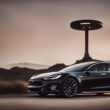Byton not only wants to announce, but deliver. At the end of the year, the Chinese electric start-up presents its first model - which wants to think of the car from a new perspective.

If all the European plans of Chinese carmakers had risen, Germany's roads would have long been flooded by vehicles from the Middle Kingdom. But with the electromobility wave, China's expansion plans are getting new energy. Particularly ambitious is the premium manufacturer Byton. Already 2020 should land the first cars here.

The company from Nanjing wants to present its first production car already this autumn at the IAA. At the same time, production begins in the purpose-built plant in China. At the beginning of 2020, the first cars are supposed to roll onto the streets of their home country. From the middle of the year, the expansion starts in North America and Europe. At the end of the year, it will be Germany's turn, announces Byton boss Daniel Kirchert. The German is one of the founders of the company, which was only established at the end of 2017, and previously worked for BMW in China.

Kirchert and other Byton managers with BMW past in this country are a bit of a pawn for the seriousness and seriousness of the ambitious plans. In addition, influential investors such as the Chinese Internet giant Tencent, the car manufacturer FAW and the electronics giant Foxconn. Another round of investors is nearing completion, according to Kirchert.

The most important argument when soliciting donors is the first car of the brand. The Byton M-Byte - an electric crossover in the premium segment - is to be shown in the finished production version for the first time in the autumn, possibly in the context of the IAA. What has been presented in the form of studies, shows the not necessarily novel, but uncommonly consistent approach of the Chinese, whose company name is the short form for "Bytes on wheels" (bytes on wheels): The M-Byte does not want a classic electric car networked features and electronic gadgets, but a smartphone on wheels. The car is not built around a drive and the wheels, but around the infotainment system, whose central manifestation is a gigantic vertical screen in the dashboard that allows access to anything that makes the cell phone live outside of the car.

For the technical data of the M byte Byton holds for this reason so far rather something back. It is clear that there will be two different sized batteries, one with 71, the other with 95 kWh capacity. The ranges are from 400 to 520 kilometers, the engine power up to 350 kW / 476 PS in the four-wheel drive version. Acceleration and top speed? Sufficient, says Kirchert. The Chinese are a bit of an alternative to Tesla. The Americans also rely on networking, high-tech electronics and electric drive - but clearly put the performance aspect of their high-speed sedans and SUVs at the center.
With premium claim and price Byton positions itself in similar spheres as the Americans. Around 45.000 Euro is to cost the basic variant of the M-Byte in Germany, whereby for the market start the higher-value and more expensive executions are to be had first. For sales, the Chinese set similar to Tesla on "Brand Stores" in prime inner city locations, they are to be operated by regional car dealers. They will also take over the garage service, mainly with pickup and delivery service. Negotiations are already underway, according to Kirchert.
However, the most important task for success in Germany should initially be to increase awareness of the brand. The central element here is a performance at the Frankfurt Motor Show in autumn. In addition, there will be numerous individual events where you want to address potential customers. On the other hand, the brand renounces classic advertising.
Apart from private customers, Byton also sees opportunities in the mobility business - for example, the M-Byte and its planned sister model, the K-Byte limousine, could be used in car and ride-sharing services. At some point possibly as an autonomous robotaxi. The technology wants to make the Chinese available as early as possible: the M-byte should have from the start level 3 autonomy on board, which allows the automated drivers on the highway. In preparation is level 4 technology, which relieves the driver in urban traffic.
The overall package seems to convince many technology-savvy customers: Byton has already collected around 50.000 pre-orders worldwide. They should be operated as quickly as possible - around 300.000 cars are to be built each year with full factory capacity. However, the start-up Faraday Future has recently shown that interesting products and ambitious plans are no guarantee of success despite the growing e-car market, whose brilliant start already seems to have fizzled out. And the Chinese brands Nio and World Champion have still not been able to deliver on their soaring promises. And if established manufacturers such as VW, Mercedes and Audi are now entering the market, it doesn't make things easier for Byton and Co.




